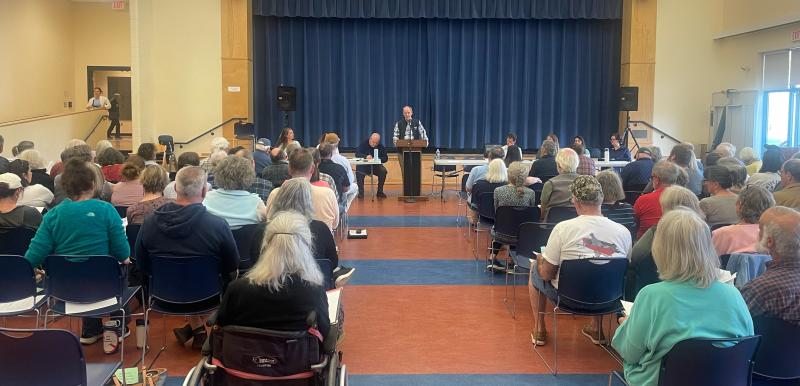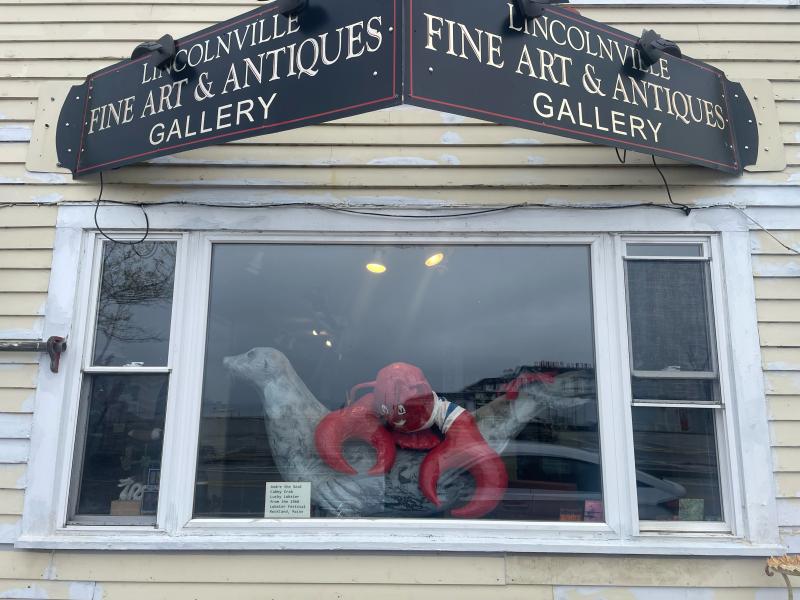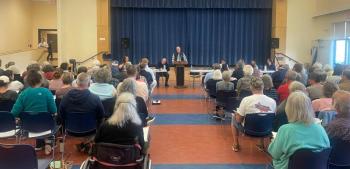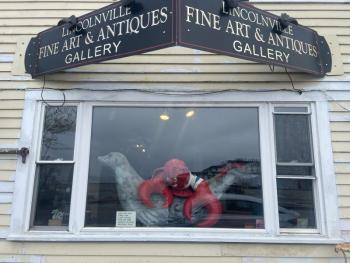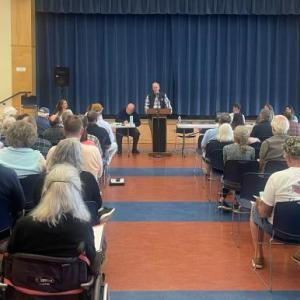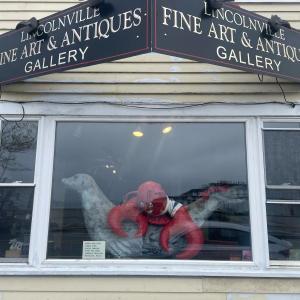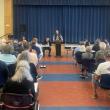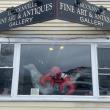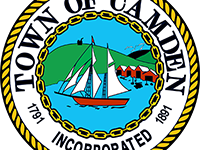This Week in Lincolnville: Town Meeting
The New England Town Meeting. In my opinion, one of the purest forms of direct democracy, where the citizens vote themselves, not their elected representatives. The history dates back to Colonial times, when the Puritans decided to run their small communities the way parish churches were back in England, with a gathering of the people (land-owning men) to determine the direction of their community. This became the practice across New England,and continuing to survive to this day in small towns across the region.
Like Lincolnville.
While Lincolnville has kept records of the facts of Town Meetings past, this does not illustrate the flavor of the meetings. There are town reports, of course. These documents were held onto, and are often donated to the Lincolnville Historical Society, and are frequently well marked up, as the long ago owner sat in a long ago Town Meeting, taking notes. The town reports contained records of who paid what for taxes, how much each municipal or school employee was being paid, who was paying off their taxes by working on the roads. They don’t contain the gritty details of town meeting, though.
Traditionally, Town Meeting was held at the Tranquility Grange on the first Monday in March. It had to be then, because soon after, many of the town roads would become mired in mud, knee deep or more. Mud season used to really mean something.
It was an all day affair, with the women heading downstairs to the kitchen to prepare the noon meal, while the men went about town business. I wonder about other ways women participated in the running as universal suffrage was not passed until 1920. I hear it took even longer in some communities, when it came to Town Meeting, before women were fully participating.
Town Meeting was a time to see people, during a time when people weren’t able to get out as much. This was especially true for women, whose work was generally in the home. A letter in the Lincolnville Historical Society archives written in the late 19th century by a Lincolnville woman to her daughter states that she had a visitor, who was the first other female she had seen in three weeks.
Town Meetings could get quite contentious, as the main topic was spending money. There are stories of fist fights, perhaps spurred on by some clandestine consumption of adult beverages, and general hooting and hollering. Lincolnville was an impoverished town for much of its history. The population was 2,150 in 1850, and had shrunk to 811 in 1920. When my parents bought this old farmhouse in 1970, the population was still only 995.
Talking to my Ma about her memories of Town Meeting in the 1970s, she talks about going to the Grange (I believe it was probably switched to LCS around 1980 when the major addition was made to the school.) As you came in, you were given slips of paper with the names of those running for public office, like school committee and select board.
The town clerk at the time, Ilene Young, knew everyone in town, though if you were new, she would make sure she knew you from then on. You put your preferred candidate’s name in the box. But then, as now, most votes are done by a show of hands, in public, for all to see. You can imagine how this leads to conversations and grumbling at times.
At some point in the late 1970s or early 1980s, the “Australian Ballot” was adopted, the secret ballot we know today. The way it works now is after the school budget is voted on by the school and budget committees, it goes to a special Town Meeting just for the school. It is at this meeting that the townspeople make their votes, and the resulting number is put on the ballot in June along with the candidates for local election. This will be held June 11 this year. The following Thursday (June 13) is the municipal Town Meeting, where the attendees vote directly on the municipal budget. In both the school and municipal budgets, it is the townspeople who get the final say. But only if you vote and then show up for the meeting.
This past Thursday was the school budget Town Meeting. As it involved some significant increases in the budget request, it was a bit livelier than most. And, as Town Meetings are not always well attended, I did note some confusion on the rules and traditions of this old style of democracy. But people got the chance to make their concerns heard, both for and against. In the end, the budget recommended by the School Committee, which came out slightly lower than the number on the budget warrant, due to some last minute calculations, passed, and will be voted on by the town one more time by secret ballot on June 11.
One of the comments that really struck me was a former long term Budget Committee member who brought up that when he first started looking at school budgets, the town was only responsible for raising around 25% of the funds, with the rest provided by state and federal funds. Currently the situation is reversed with Augusta and D.C. putting more and more of the burden on local taxpayers.
Lincolnville is not the same town it was in 1850, or 1920 or 1970. Or the even town of my youth, in the 1980s and 1990s. In evolves and changes, while our system of government has remained largely the same. That seems OK; it’s democracy, always messy, sometimes controversial, but a pretty good idea nevertheless.
Local Icons at the Lincolnville Fine Arts Gallery
Anyone else remember the book Leroy Lobster and Crabby Crab? Written by Edward Harriman in 1967, it tells the story of two crustaceans living their adventures in Penobscot Bay.
Dwight Wass, of the Lincolnville Fine Arts Gallery, has acquired sculptures of Leroy and his buddy Crabby, and has them displayed perched on a statue of Andre the Seal in his front window overlooking the Beach.
These three Midcoast Maine icons were originally displayed at the 1968 Lobster Festival in Rockland. Anyone have a memory that goes back to that particular event? Definitely check them out, and pick up a copy of the book, which is still in print and available all over the area.
So the school budget is headed to the voters, and we have the final part of the Town Meeting to look forward to after the elections for Select Board, School Committee, and Budget Committee. I encourage everyone to consider serving on a town committee. It can be hard work, but this town is worth it. And if you can’t serve, attend a meeting or two, and get to understand how the town is run.
And as always, be kind and respectful to your neighbors, even, and maybe especially if you don’t agree with them. Tell me what you think at ceobrien246@gmail.com.
CALENDAR
Monday, May 20
Select Board with Northport Select Board, 6:15 p.m., Northport Town Office
Tuesday, May 21
Library open 3-6 p.m. 208 Main Street
AA Meeting 12 p.m., Community Building, 18 Searsmont Road
Lakes and Ponds Committee, 7 p.m. Town Office
Wednesday, May 22
Library open 2-5 p.m.
Friday May 24
AA Meeting 12 p.m., Community Building, 18 Searsmont Road
Library open 9-12, 208 Main Street
Saturday, May 25
Library open 9-12, 208 Main Street
Sunday, May 26
United Christian Church, 9:30 a.m. Worship, 18 Searsmont Road
Bayshore Baptist Church, 9:30 a.m. Sunday School, 11:00 worship, 2648 Atlantic Highway

